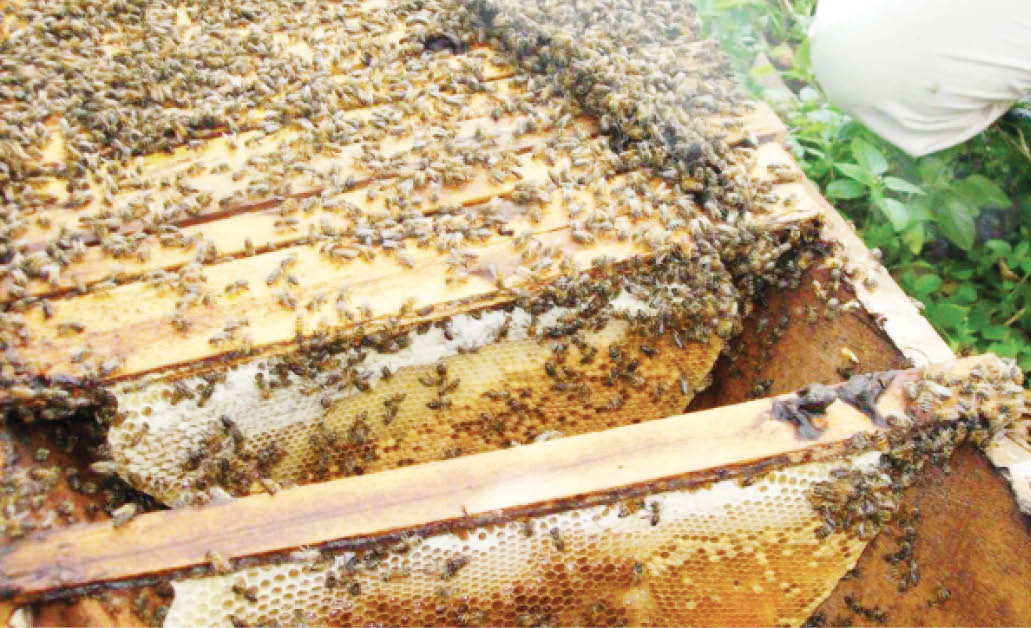How farmers can find riches in bee farming
…global trade worth N162tr – Experts ….Ethiopia rakes N91.9bn annually Bee keeping otherwise called apiculture is one industry in the agricultural sector that many young farmers avoid but has huge potential for economic benefits. Experts believe the apiculture industry has enormous potential to change the financial status of farmers if it is fully embraced. A […]

A bee farm
- …global trade worth N162tr – Experts
- ….Ethiopia rakes N91.9bn annually
Bee keeping otherwise called apiculture is one industry in the agricultural sector that many young farmers avoid but has huge potential for economic benefits.
Experts believe the apiculture industry has enormous potential to change the financial status of farmers if it is fully embraced.
A bee-keeping expert, Obianuju Okpo, described apiculture as the “world’s riches in the mouth of the bees”, stressing that it can contribute tremendous monetary value to the economy of any nation that harnesses the potentials in the sector.
Citing statistics, the expert puts the world beekeeping trade value chain at $450 billion amounting to about N162 trillion while the pollination output value was estimated at $250bn (about N90 trillion).
Mrs Okpo also said the world honey production stands at 1.8 million metric tonnes valued at $11.5 billion (about N4.14 trillion).
Of this global market size, Africa, which has the world’s finest specie of bees takes only 5%, estimated at 90,000 metric tonnes – something experts think needed to be corrected.
Ethiopia is Africa’s largest producer with 40,000 metric tonnes valued at $255.3 million which is about N91.9 billion.
Nigeria only produces 15,000 metric tonnes estimated at $96.02 million amounting to N34.6 billion.
For a farmer who wants to invest in the industry, she said such a starter needs about N210,000 to have 10 hives which include two bee suits, two pairs of gloves, two pairs of shoes, hive tool and one smoker for harvest activities.
With this investment, a farmer can harvest up 150kg of honey and 37kg of bees wax, which can fetch him about N524,000 or more per harvest – usually after six months.
A bee pollination expert, Oluwaseun Johnson, stated that two-thirds of the world’s 3000 species of agricultural crops require agents for pollination.
Between US$235 billion and US$577 billion worth of annual global food production relies on direct contributions by pollinators such as bees.
Although he said the exact economic value of bee pollinated crops globally is not known, he however noted that “bees exclusively pollinate almonds, 90% of blueberries, apples, avocados, cucumbers, oranges and pumpkins.”
Mrs Ngozi Ibe, Head, Manufactures Unit, Product Development Department of the Nigerian Export Promotion Council, Abuja stressed that the diverse uses and demand of products in the apiculture value-chain (Beeswax, Propolis, Bee Venom, Royal Jelly, Pollen, and Honey) is market-driven due to its uses in various industries and offers export opportunities with huge potentials.
She said beeswax, which is used in the cosmetics, automobiles and food industry, has an average international price of US$10.
Other value chains include bee Propolis used for dental/oral and healthcare and royal jelly used for pharmaceuticals, reproductive and food supplements.
Mrs Ibe also noted that bee venom, which has anti-cancer, anti-ageing properties and bone health in crystallized form, is sold at US$2,000 per gram.
These experts believe that farmers don’t really need to own land to start. They particularly advised orchard farmers to take huge advantage of bees pollinating activities to significantly increase output of the tree crops.
